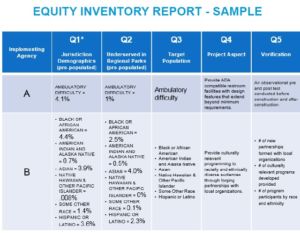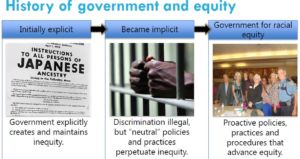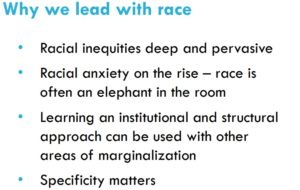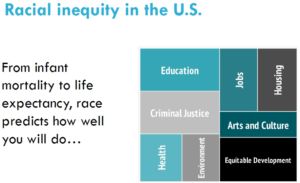Met Council Holds Workshop on Climate-Caused Racism
It’s no stretch to say the Met Council is on a mission to make race an issue in every conceivable aspect of local and regional government under its jurisdiction. But racial disparities due to global warming?
That’s the focus of the latest Met Council workshop being held in Minneapolis today for metro-wide city and county government workers being trained to be on the watch for climate-related racism in their communities.
They [communities of color] frequently bear a disproportionate share of the burden of environmental degradation and are more vulnerable to climate change impact. This session will strengthen your community’s ability to prepare and respond to climate impacts for all residents using examples that show how using racial equity tools reduces the impact of climate change and increases opportunity for greater community health.
Using taxpayer dollars, the Met Council has quietly teamed up with a radical national organization called the Government Alliance on Race and Equity to hold workshops that inject race into government decision-making.
American Experiment exposed the tip of the equity iceberg last year with the Met Council’s mandatory racial equity toolkit for local governments applying for millions of dollars of park grants.
The toolkit contains spreadsheets for measuring participation in the parks by ethnicity, establishing race-based benchmarks as a priority for projects. It’s not clear how local staff are supposed to obtain and verify the background information on park users, but they’re encouraged to use so-called “Equity Inventory Reports” to break down ethnic groups into minute percentages.
A sample EIR in a lengthy power point presentation plugged in .008% as the number for “Native Hawaiian & Other Pacific Islander.” The slide also listed “American Indian & Alaska Native” at .7%, Asian 3.9% and left open the possibility for “Some Other Race.”
The program appears to be based on the premise that the goal of government should be to require equal outcomes for racial groups in transportation, housing, parks, land use and development.
 A joint Met Council-GARE workshop in March, for example, instructed city and county government employees on how to “advance racial equity” in their required 2040 comprehensive plan updates. The effect could be felt for decades to come.
A joint Met Council-GARE workshop in March, for example, instructed city and county government employees on how to “advance racial equity” in their required 2040 comprehensive plan updates. The effect could be felt for decades to come.
 Slides used in the workshop’s power point depicted both government and staff as inherently biased against people of color across the board.
Slides used in the workshop’s power point depicted both government and staff as inherently biased against people of color across the board.
The workshop focused on normalizing racial equity as a key value with clear definitions of key terminology, operationalizing racial equity via new policies and institutional practice, and organizing, both internally and in partnership with other institutions and the community.

The Met Council is far from alone among metro area governments in squandering taxpayer dollars on the controversial race-based program. But how did Minnesota get to the point having more local and state government adherents to the divisive GARE program than any other state? American Experiment will follow up in future posts.